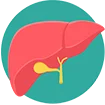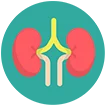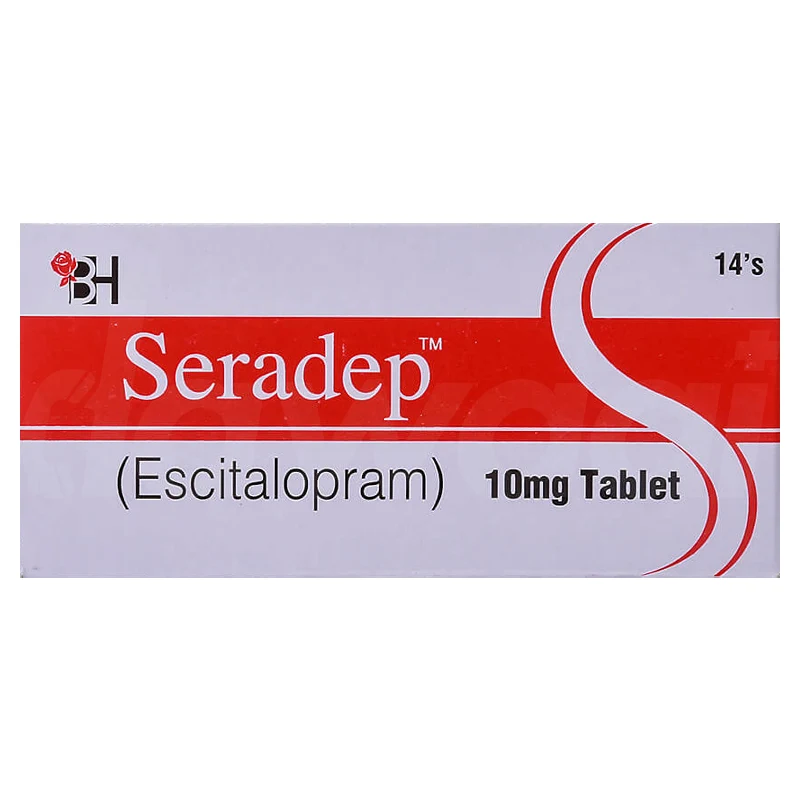Introduction
How To Use
- Escitalopram should be taken either with food or without food as advised by your doctor, typically once a day in the morning or in the evening.
- The dosage is determined by your health condition, treatment response, laboratory tests, age and any other medicines you are currently taking.
- Take Escitalopram precisely as directed by your doctor.
- Swallow the tablet with water.
- Do not crush, chew or break the tablet.
- Do not discontinue taking Escitalopram without first consulting your doctor.
Expert Advice
- Take this medication with or without meals.
- Avoid alcohol and caffeine while on this medication
- Contact your doctor immediately if there is an allergic reaction to this medication or any of the side effects appear.
- Do not stop taking this medication all of a sudden. Consult your doctor before leaving this medication suddenly.
Primary Uses
Depression
Indications
- Depression, also known as major depressive disorder, is a very serious and severe mental health illness that has a negative impact on how you think, feel, and act, leading to a loss of motivation and a chronic sad mood. Suicide attempts are possible as a result of this. Escitalopram is a medicine used to treat depression.
A generalized anxiety disorder is characterized by a persistent fear that interferes with daily life. Escitalopram is a medicine used to treat generalized anxiety disorder.
Side Effects
The side effects of this medication include sexual dysfunction, anxiety, tremor (shaking), myalgia (pain in muscles), arthralgia (pain in joints), weight gain, abnormal dreams, fatigue (tiredness), GI upset (stomach upset), sweating, nausea, drowsiness, insomnia (inability to sleep), dry mouth, fever, sinus infections, and dizziness.
Warnings
 Pregnancy
Pregnancy
Escitalopram should be taken only when absolutely necessary during pregnancy. It has the potential to cause harm to an unborn child. Furthermore, babies born to women who were using Escitalopram in the last trimester of pregnancy may experience symptoms of withdrawal such as feeding difficulties, breathing difficulties seizures, muscular rigidity, or continuous crying. Pregnant females are advised to consult their doctors regarding the benefits and risks of Escitalopram before using it.
 Lactation
Lactation
Escitalopram enters breast milk and can have adverse effects on a nursing baby. Lactating females should consult their doctor before using Escitalopram.
 Driving
Driving
Escitalopram use may impair one’s ability to take decisions and react quickly in an emergency. As a result, you should exercise extreme caution when driving vehicles.
 Liver
Liver
People with liver diseases should consult their doctors before using Escitalopram.
 Kidney
Kidney
People with kidney diseases should consult their doctors before using Escitalopram. Depending on their condition, the doctor may change the dose of Escitalopram in kidney patients.
 Alcohol
Alcohol
It is not suggested to drink alcohol while taking Escitalopram since it can exacerbate adverse effects like dizziness and concentrating difficulties.
 Precautions
Precautions
Inform your doctor if you are hypersensitive to Escitalopram or Escitalopram, or if you have other allergies. Inactive components in this product may trigger allergy reactions or other complications. For more information, consult your doctor. Inform your doctor about your medical history, especially if you have a personal or family history of bipolar or manic-depressive disorder, a family or personal history of attempting suicide, liver problems, seizures, low blood sodium, intestinal bleeding/ulcers (peptic ulcer) or bleeding disorders, and a family or personal history of glaucoma. Escitalopram has been linked to a heart rhythm disorder (QT prolongation). QT prolongation can induce dangerous (occasionally fatal) irregular/fast heartbeat as well as other symptoms (such as extreme dizziness and fainting) that require immediate medical intervention. If you have specific medical problems or are using other medicines that may induce QT prolongation, your risk of getting QT prolongation may be increased. Before taking Escitalopram, inform your doctor or pharmacist of all the medicines you are currently taking, as well as if you suffer from any of these conditions: specific heart issues (heart failure, sluggish heartbeat, recent heart attack, prolongation o QT in the EKG), a family history of specific heart conditions (prolongation of QT in the EKG, sudden cardiac death). Low magnesium and potassium levels in the blood may potentially raise your likelihood of QT prolongation. This risk may rise if you are using certain medicines (such as diuretics) or have problems such as excessive perspiration, diarrhea, or vomiting. Consult your doctor about how to use Escitalopram safely. Inform your doctor or dentist about all of the medicines you consume before undergoing surgery (including prescription, nonprescription and herbal medicines). Escitalopram adverse effects, particularly bleeding, incoordination, and QT prolongation, may be more severe in older persons. They could also be more prone to salt imbalances (hyponatremia), particularly if they are simultaneously taking (diuretics). Falls can be exacerbated by a loss of coordination. Children are more sensitive to the negative effects of Escitalopram, including lack of hunger and weight loss. Children who are using this medicine should have their height and weight measured.
Contraindications
- Escitalopram is contraindicated in patients with hypersensitivity to Escitalopram or other components present in this medicine.
- Monoamine oxidase inhibitors are a type of medicine used to treat depression. Escitalopram should not be used in conjunction with Monoamine Oxidase Inhibitors (MAOIs) since it increases the danger of serotonin syndrome (increased serotonin level in the body).
FAQS
What are the uses of Escitalopram?
This medication is used for the treatment of depression.
How to store Escitalopram?
Please store this medicine at room temperature (18-25 Celsius). Keep medicine away from excessive light, moisture, and children. Please do not flush medicines down the toilet. Please read the leaflet provided with the medicine for further storage guidance.
When should I contact my prescriber?
Contact your prescriber if there is severe headache, nightmares, lack of sleep, irritability, confusion and abdominal disturbances.
What is the dosage in adults?
The dosage in adults is 10mg once daily, increasing maximum to 20mg once daily if required.
Is it recommended in children?
No, this medication is not recommended in children.
Disclaimer
Dawaai’s intention is to make sure that it’s consumers get information that is accurate, reviewed by an expert and error-free. However, the information mentioned here should not be used as a replacement for the advice of a qualified physician. The information given here is for informational purposes only, which may not cover all possible precautions, side effects, contraindications or drug interactions. Consult your doctor and discuss your queries related to any medicine or disease.





Reviews
There are no reviews yet.